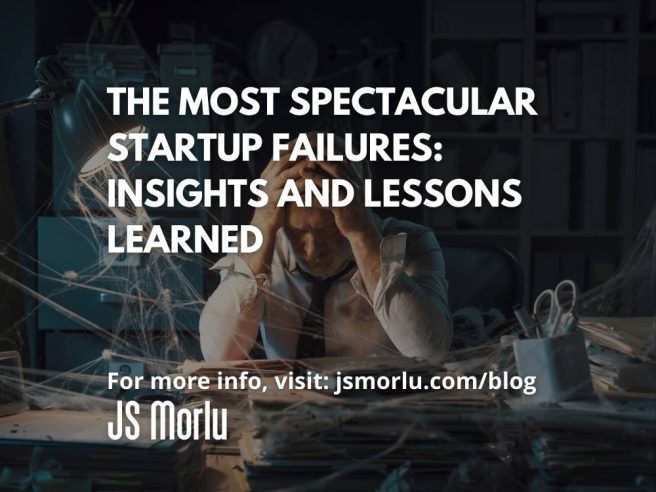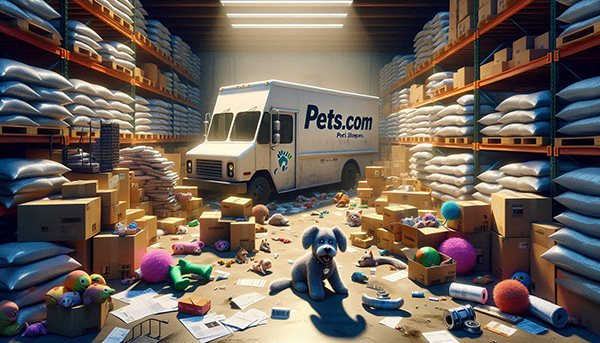By: John S. Morlu II, CPA
Startups are often seen as the lifeblood of innovation, sparking the imagination with visions of groundbreaking technology and industry disruption. They carry the promise of transforming ideas into reality, but beneath the allure lies a harsh truth: many startups, even those backed by millions of dollars and hailed as the next big thing, can and do fail. The stories of these failures are not just cautionary tales; they are rich with insights and lessons that are invaluable for any entrepreneur aiming to navigate the treacherous waters of building a successful venture.
In this article, we delve into ten of the most spectacular startup failures—ventures that once soared on the wings of potential but crashed due to missteps and unforeseen challenges. By analyzing these high-profile downfalls, we uncover the critical mistakes made, the opportunities missed, and the lessons learned. Whether you’re a seasoned entrepreneur or an aspiring founder, these stories offer a powerful guide on what to avoid and how to build a startup that not only survives but thrives in today’s competitive landscape. Read on to discover the vital takeaways that could make the difference between success and failure in your entrepreneurial journey.

Chapter 1: Theranos
Overview: Founded in 2003 by Elizabeth Holmes, Theranos aimed to revolutionize blood testing with a device that required only a few drops of blood. The company, which raised nearly $1 billion, collapsed in 2015 amid revelations of fraud.
Total Dollars Raised: $1 billion
Valuation at Collapse: $9 billion
Years in Business: 12 years
Year Founded: 2003
Year Collapse: 2015
Failure Analysis: Theranos’s downfall resulted from a combination of technological deception and unethical practices. The company misled investors, patients, and regulatory bodies about the capabilities of its blood-testing technology. It concealed internal failures and falsified data to maintain a facade of innovation. The unraveling of Theranos’s fraudulent claims highlighted the perils of overpromising and the lack of scientific validation.
Instructive Lessons:
1. Scientific Validation and Transparency: It is critical for startups, especially in health and technology, to ensure that their claims are substantiated by rigorous testing and validation. Transparency in reporting results and challenges builds trust with stakeholders.
2. Ethical Integrity: Maintain high ethical standards and avoid misleading investors and customers. Integrity should be a cornerstone of any successful business venture.
Chapter 2: Pets.com
Overview: Pets.com was an online pet supply retailer that became a symbol of the dot-com bubble burst. Despite a high profile and substantial funding, it went bankrupt in 2000.
Total Dollars Raised: $110 million
Valuation at Collapse: $300 million
Years in Business: 2 years
Year Founded: 1998
Year Collapse: 2000
Failure Analysis: Pets.com’s failure was largely due to an unsustainable business model and operational inefficiencies. The company faced high shipping and warehousing costs, which eroded its profit margins. The inability to attract a sufficient customer base and competition from established retailers further contributed to its downfall.
Instructive Lessons:
1. Business Model Viability: Startups must carefully evaluate their business model to ensure it is sustainable and scalable. This includes understanding cost structures and revenue generation mechanisms.
2. Cost Management: Effective cost management is crucial. Balance marketing expenditures with operational costs and avoid overspending on high-profile promotions if they do not translate into customer acquisition.
Chapter 3: Quibi
Overview: Quibi, launched in 2020, was a short-form video streaming service designed for mobile users. Despite raising $1.75 billion, the company failed to attract a substantial user base and shut down in 2020.
Total Dollars Raised: $1.75 billion
Valuation at Collapse: $0 (shutdown)
Years in Business: 6 months
Year Founded: 2018
Year Collapse: 2020
Failure Analysis: Quibi’s failure can be attributed to a mismatch between its product offering and market demands. The service’s short-form content was not compelling enough to justify a subscription fee, particularly as users increasingly preferred flexible, ad-supported content. The COVID-19 pandemic also shifted consumer behavior towards more versatile content consumption across various platforms.
Instructive Lessons:
1. Market Fit: Ensure that the product or service aligns with current consumer preferences and market trends. Regularly validate the product-market fit to adapt to changing user needs.
2. Value Proposition: Clearly define and communicate the unique value proposition of the service. Ensure that it addresses a specific need or gap in the market.
Chapter 4: Jawbone
Overview: Jawbone, known for its wearable fitness trackers, raised substantial funding but struggled with product quality and market competition. The company went bankrupt in 2017 after 14 years of operation.
Total Dollars Raised: $930 million
Valuation at Collapse: $100 million
Years in Business: 14 years
Year Founded: 1999
Year Collapse: 2017
Failure Analysis: Jawbone’s failure was characterized by product quality issues and a highly competitive market. The company’s devices faced reliability problems, which led to poor customer reviews and high return rates. Furthermore, the market for fitness trackers became saturated with competitors offering more advanced and reliable products.
Instructive Lessons:
1. Product Quality: Consistently prioritize and ensure high product quality. Address technical issues and customer complaints promptly to maintain brand reputation.
2. Market Differentiation: Develop a strategy to differentiate from competitors. Focus on unique features or innovations that provide a competitive edge.
Chapter 5: Better Place
Overview: Better Place, founded in 2007, sought to revolutionize electric vehicle infrastructure with battery-swapping stations. Despite raising over $850 million, it shut down in 2013 due to technical and market challenges.
Total Dollars Raised: $850 million
Valuation at Collapse: $0 (shutdown)
Years in Business: 6 years
Year Founded: 2007
Year Collapse: 2013
Failure Analysis: Better Place’s failure was rooted in its overly ambitious vision and the lack of market readiness. The company invested heavily in infrastructure that was not supported by a sufficient user base. Additionally, the electric vehicle market was not mature enough to adopt the battery-swapping model at scale.
Instructive Lessons:
1. Market Readiness: Ensure that the market is ready for new technologies and infrastructure. Validate demand and support for the business model before committing substantial resources.
2. Infrastructure Investment: Align infrastructure investments with achievable market adoption rates and technological readiness.
Chapter 6: Fyre Festival
Overview: The Fyre Festival, promoted as a luxury music festival in 2017, failed dramatically despite raising significant funds. The event’s execution was marred by inadequate accommodations and misleading promotions, leading to its collapse.
Total Dollars Raised: $26 million
Valuation at Collapse: $0 (shutdown)
Years in Business: 1 year
Year Founded: 2016
Year Collapse: 2017
Failure Analysis: The Fyre Festival’s failure resulted from severe mismanagement and misleading marketing. The organizers promised a high-end experience but failed to deliver basic necessities. The contrast between promotional material and actual conditions led to widespread backlash and legal troubles.
Instructive Lessons:
1. Realistic Planning: Invest in comprehensive planning and realistic execution. Ensure that all logistical aspects are feasible and properly managed.
2. Honest Promotion: Avoid deceptive marketing practices. Represent products and services accurately to build and maintain trust with customers.
Chapter 7: Bodega
Overview: Bodega, founded in 2017, aimed to disrupt the convenience store industry with automated vending machines. Despite initial excitement, it faced backlash and criticism, leading to its shutdown in 2019.
Total Dollars Raised: $2.5 million
Valuation at Collapse: $0 (shutdown)
Years in Business: 2 years
Year Founded: 2017
Year Collapse: 2019
Failure Analysis: Bodega’s failure was largely due to a disconnect between its business model and community values. The company’s concept of replacing neighborhood stores with automated machines was perceived as insensitive and impractical. The backlash highlighted the importance of considering the impact on existing businesses and community sentiment.
Instructive Lessons:
1. Community Engagement: Engage with and understand community needs and sentiments. Ensure that new business models do not negatively impact local businesses and are perceived as positive innovations.
2. Market Research: Conduct thorough market research to validate the practicality and acceptance of new business concepts.
Chapter 8: Clinkle
Overview: Clinkle, founded in 2011, aimed to create a revolutionary digital payment solution. The company raised $30 million but faced delays and operational challenges, leading to its closure in 2015.
Total Dollars Raised: $30 million
Valuation at Collapse: $0 (shutdown)
Years in Business: 4 years
Year Founded: 2011
Year Collapse: 2015
Failure Analysis: Clinkle’s failure stemmed from several issues, including technical delays and management conflicts. The company struggled to deliver on its promises, and internal conflicts further hindered progress. The lack of a clear value proposition and failure to execute effectively contributed to the company’s collapse.
Instructive Lessons:
1. Execution and Development: Focus on timely development and execution of products or services. Address technical and operational challenges promptly to avoid delays.
2. Management Cohesion: Build a strong and cohesive management team to navigate challenges effectively and maintain focus on the business vision.
Chapter 9: Magic Leap
Overview: Magic Leap, founded in 2010, sought to revolutionize augmented reality (AR) with innovative technology. Despite raising over $2 billion, the company struggled to meet expectations and faced significant challenges by 2023.
Total Dollars Raised: $2.6 billion
Valuation at Collapse: $0 (company still operational but struggling with high expectations)
Years in Business: 13 years
Year Founded: 2010
Year Collapse: 2023 (still operational but struggling)
Failure Analysis: Magic Leap faced challenges related to overpromising and under-delivering. The company’s technology did not live up to the high expectations set by its promotional materials. The high cost of its devices and technical limitations further restricted market adoption. Despite ongoing efforts, the company struggled to gain significant traction in the consumer market, leading to persistent financial challenges and questions about its long-term viability.
Instructive Lessons:
1. Realistic Promises: Set achievable and realistic goals for technology and product development. Ensure that promotional materials accurately reflect the current capabilities of the technology to avoid building unrealistic expectations.
2. Market Fit and Pricing: Develop products that align with market needs and price points. Consider the practical applications of the technology and its affordability to ensure broader market adoption.
Chapter 10: Zirtual
Overview: Zirtual, founded in 2011, provided virtual assistant services. The company faced rapid growth followed by a sudden shutdown in 2015 after failing to manage operational scalability and financial stability.
Total Dollars Raised: $8.5 million
Valuation at Collapse: $0 (shutdown)
Years in Business: 4 years
Year Founded: 2011
Year Collapse: 2015
Failure Analysis: Zirtual’s collapse was due to an inability to scale operations effectively and financial mismanagement. The company experienced significant growth but struggled to manage the increased demand for services, leading to operational and quality issues. Poor financial oversight and the inability to sustain cash flow further exacerbated the situation.
Instructive Lessons:
1. Scalable Operations: Plan and implement scalable operational processes to manage growth effectively. Ensure that systems and resources can handle increased demand without compromising service quality.
2. Financial Management: Maintain strict financial oversight and ensure that funding is used efficiently to support growth. Develop a robust financial strategy to manage cash flow and operational costs.
Overall Insights and Lessons Learned
Starting and scaling a successful startup is one of the most challenging endeavors an entrepreneur can undertake. The journey is fraught with uncertainty, and even the most promising ventures can stumble and fall. However, by learning from past failures and applying these insights, entrepreneurs can significantly improve their chances of success. Below are six critical lessons that every aspiring or existing entrepreneur should internalize:
1. Thorough Market Research
Understanding Market Needs: A brilliant idea is just the beginning. The real challenge lies in ensuring that this idea addresses a genuine market need. This requires deep market research—going beyond surface-level analysis to understand the intricacies of consumer behavior, industry trends, and competitive dynamics. Entrepreneurs must ask themselves: Who is the target customer? What are their pain points? How is the market currently addressing these needs, and where are the gaps?
Avoiding Misalignment: Many startups fail because they create products or services that do not resonate with the market. This misalignment often stems from assumptions that do not hold true in reality. To avoid this pitfall, engage directly with potential customers through interviews, surveys, and pilot programs. The goal is to gather actionable insights that inform product development and marketing strategies. Remember, a product that doesn’t meet market demand will struggle, no matter how innovative or well-executed it may be.
2. Sustainable Business Models
Building a Viable Model: A great product alone is not enough; it must be supported by a sustainable business model. This means carefully considering how your startup will generate revenue, control costs, and achieve profitability. Will you rely on subscriptions, one-time sales, or a freemium model? How will you price your offering to cover costs while remaining attractive to customers?
Testing Before Scaling: Before committing significant resources to scale, validate your business model on a smaller scale. This validation process can include running pilot programs, conducting financial projections, and analyzing customer acquisition costs versus lifetime value. Scaling prematurely without a proven business model can lead to operational strain and financial instability. Ensure that your revenue streams and cost structures are robust enough to support growth over the long term.
3. Effective Communication
Transparency with Stakeholders: Clear and honest communication is the foundation of trust between a startup and its stakeholders. This includes investors, customers, employees, and partners. Overpromising or withholding critical information can lead to mistrust, damaging relationships and potentially jeopardizing the startup’s future.
Managing Expectations: Entrepreneurs often feel pressured to present their venture in the best possible light, but it is essential to manage expectations realistically. If you promise more than you can deliver, the eventual disappointment can lead to a loss of credibility. Be upfront about the challenges and risks associated with your business, and communicate progress and setbacks openly. This transparency not only builds trust but also fosters a culture of accountability within the organization.
4. Operational Efficiency
Scaling Operations: As your startup grows, so too must your operational capabilities. However, scaling operations is a complex task that requires careful planning. Efficient operations are crucial to meeting customer demand, maintaining quality, and controlling costs. This involves optimizing supply chains, implementing scalable processes, and leveraging technology to streamline operations.
Avoiding Operational Bottlenecks: Many startups encounter bottlenecks as they grow, which can lead to missed opportunities, customer dissatisfaction, and financial losses. To prevent this, continuously assess your operational processes and be willing to invest in the infrastructure and talent necessary to support growth. Regularly review key performance indicators (KPIs) to identify and address inefficiencies before they escalate.
5. Ethical Practices
Building Trust: In the fast-paced world of startups, it can be tempting to cut corners to achieve short-term gains. However, compromising on ethics can have long-lasting negative effects. Upholding ethical practices in every aspect of your business is not just about avoiding legal issues—it’s about building a reputation for integrity and trustworthiness.
Long-Term Success: Startups that engage in unethical behavior may experience short-term success but often face severe consequences in the long run, including legal battles, loss of customer trust, and reputational damage. By committing to high ethical standards, you can build a strong, positive brand that attracts loyal customers, talented employees, and supportive investors. Ethical practices are not just good for business—they are essential for long-term success.
6. Adaptability
Embracing Change: The startup landscape is constantly evolving, with new technologies, market shifts, and consumer preferences emerging all the time. Successful startups are those that remain agile and responsive to these changes. Being adaptable means having the ability to pivot your strategy, product offering, or business model in response to new information or changing conditions.
Resilience in the Face of Challenges: Adaptability also involves resilience—the ability to withstand setbacks and learn from failures. No startup journey is without challenges, but those that can adapt and persevere are more likely to survive and thrive. Encourage a culture of continuous learning and innovation within your startup, where team members are empowered to experiment, take calculated risks, and embrace change.
Final Thoughts
Building a startup is an exhilarating journey, one that demands vision, unwavering dedication, and the resilience to face inevitable challenges head-on. The stories of high-profile failures are not merely tales of defeat—they are treasure troves of wisdom, offering a clear roadmap for avoiding the common pitfalls that have derailed others. By deeply understanding your market, crafting a sustainable business model, maintaining transparent communication, streamlining operations, upholding the highest ethical standards, and embracing adaptability, you equip yourself to navigate the tumultuous waters of entrepreneurship with confidence.
Each lesson gleaned from these failures is more than just advice; it’s a vital stepping stone toward building a startup that doesn’t just survive, but truly thrives in an ever-evolving business landscape. As you embark on or continue your entrepreneurial journey, let these insights guide you, helping you to anticipate challenges, seize opportunities, and steer your venture toward lasting success. In the dynamic and often unforgiving world of startups, the ability to learn from the past and adapt for the future is your greatest asset—use it wisely to turn your vision into reality.
Author: John S. Morlu II, CPA is the CEO and Chief Strategist of JS Morlu, leads a globally recognized public accounting and management consultancy firm. Under his visionary leadership, JS Morlu has become a pioneer in developing cutting-edge technologies across B2B, B2C, P2P, and B2G verticals. The firm’s groundbreaking innovations include AI-powered reconciliation software (ReckSoft.com) and advanced cloud accounting solutions (FinovatePro.com), setting new industry standards for efficiency, accuracy, and technological excellence.
JS Morlu LLC is a top-tier accounting firm based in Woodbridge, Virginia, with a team of highly experienced and qualified CPAs and business advisors. We are dedicated to providing comprehensive accounting, tax, and business advisory services to clients throughout the Washington, D.C. Metro Area and the surrounding regions. With over a decade of experience, we have cultivated a deep understanding of our clients’ needs and aspirations. We recognize that our clients seek more than just value-added accounting services; they seek a trusted partner who can guide them towards achieving their business goals and personal financial well-being.
Talk to us || What our clients says about us














